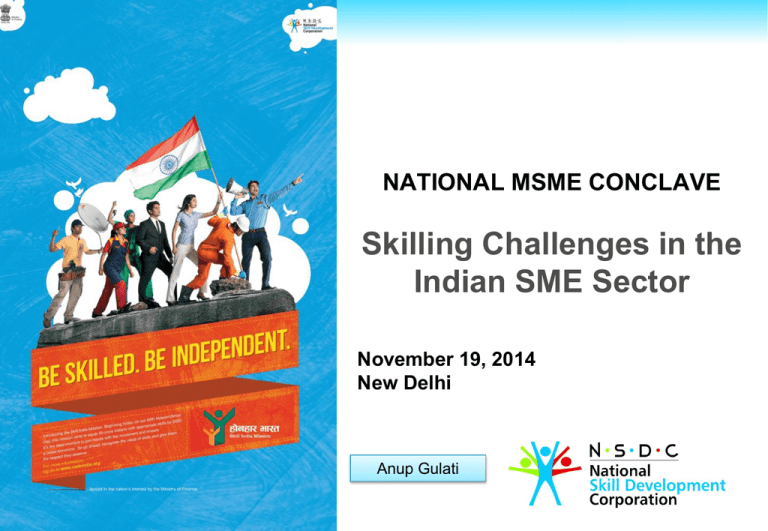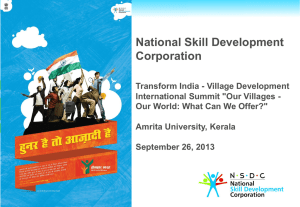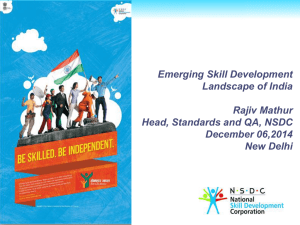
For Private Circulation only
NATIONAL MSME CONCLAVE
Skilling Challenges in the
Indian SME Sector
November 19, 2014
New Delhi
Anup Gulati
ROLE OF SMES
SMEs constitute over 90% of total enterprises
in most world economies.
In India SMEs account for more than 80% of
the total number of industrial enterprises and
employ over 6 crore people.
SME sector has consistently registered higher
a growth rate compared to the overall
industrial sector.
Proprietary and confidential. This information does not represent and should not be construed as, legal or professional advice. © 2014 NSDC. All Rights Reserved.
1
GROUND REALITIES
WORKERS:
•
•
•
Do not perceive manufacturing as an attractive sector for
employment.
Are usually class 8 and below, and come in without skills and
competencies.
Find the cost and availability of quality skilling prohibitive.
EMPLOYERS:
• Reluctant to skill workers fearing poaching and wage
demands.
• Difficulty in locating and assessing the right training
institution, especially in rural areas.
• Poor alignment of skill development institutions with industry
requirements and expectations. Lack of competency and lack
of standards.
Proprietary and confidential. This information does not represent and should not be construed as, legal or professional advice. © 2014 NSDC. All Rights Reserved.
2
SKILLING CHALLENGES
Proprietary and confidential. This information does not represent and should not be construed as, legal or professional advice. © 2014 NSDC. All Rights Reserved.
3
SKILL DEVELOPMENT LANDSCAPE
Ministry for Skill Development: The new Ministry of Skill
Development, Entrepreneurship, Youth Affairs and Sports will
work to harmonize skill development activities across the
country.
National Skill Development Corporation (NSDC): This
public private partnership (PPP) was created to catalyze the
setting-up of large-scale, for-profit, sustainable vocational
institutions, by providing low-cost funding for creation of
training capacity.
National Skill Development Agency (NSDA): Created in
June 2013 to coordinate and harmonize skill development
efforts across Central Ministries, States and the private
sector in the country.
Proprietary and confidential. This information does not represent and should not be construed as, legal or professional advice. © 2014 NSDC. All Rights Reserved.
4
THE NSDC
• PPP setup by Ministry of Finance. Equity base Rs 10
crore (Government of India 49%, Private Sector 51%)
• Private-sector shareholders include 10 business
chambers & industry associations (5.1% shareholding
each)
•
-
Federation of Indian Chambers of Commerce and Industry (FICCI)
Associated Chambers of Commerce and Industry of India (ASSOCHAM)
Confederation of Indian Industry (CII)
National Association of Software & Services Companies (NASSCOM)
Society of Indian Automobile Manufacturers (SIAM)
Confederation of Real Estate Developers Associations of India (CREDAI)
Gems and Jewellery Export Promotion Council (GJEPC)
Confederation of Indian Textile Industry (CITI)
Council for Leather Exports (CLE)
Retailers Association of India (RAI)
Proprietary and confidential. This information does not represent and should not be construed as, legal or professional advice. © 2014 NSDC. All Rights Reserved.
5
ADDRESSING CHALLENGES:
NSDC’s 3 PRONGED APPROACH
CREATE
FUND
LARGE, QUALITY
VOCATIONAL
TRAINING
INSTITUTIONS
COMMERCIALLY
VIABLE,
SCALABLE,
SUSTAINABLE
TRAINING
ENTERPRISES
CREATE THE
VISION,
DEFINE THE
PATH
DEMONSTRATE
COMMITMENT
ENABLE
•
•
•
SECTOR SKILL
COUNCILS
QUALITY
ASSURANCE &
CERTIFICATION
OCCUPATIONAL
STANDARDS
CREATE A
VIABLE
ECOSYSTEM
6
SECTOR SKILL COUNCILS:
Creating an enabling ecosystem - Aligning training with employers’ needs
TRAINING
NEED
ANALYSIS
•
•
•
•
CURRICULUM
DEVELOPMENT
ROLLOUT OF
TRAINING
ASSESSMENT &
CERTIFICATION
22 SSCs have developed
879 Qualification Packs (QPs) covering
2,247 unique National Occupational Standards (NOS) of which
455 QPs have been declared as National Standards
International collaboration to create
transnational standards
Proprietary and confidential. This information does not represent and should not be construed as, legal or professional advice. © 2014 NSDC. All Rights Reserved.
7
CREATING AN ASPIRATION FOR SKILLS
Endorsement Campaign
•
•
•
•
•
•
Advocacy campaign encouraging youth to take up
skills - a series of TV, radio, print ads and posters
supported.
A TV serial ‘Hunnarbaaz’ supported (40 episodes)
Hunar Yatra
Creating mobile kiosks which will go around the
country
Target catchment areas to like weekly markets, pooja
pandals, panchats, job fairs etc
Collaborate with local TPs to drive on-the-spot
enrollment
Proprietary and confidential. This information does not represent and should not be construed as, legal or professional advice. © 2014 NSDC. All Rights Reserved.
8
FOSTERING SKILL DEVELOPMENT IN CLUSTERS
• Campaign to increase
aspirational values of Skills
• Testimonials from Industry
Leaders
• Skilling Centers
• Leveraging ITI’s
Aspiration
Training
Employm
ent/
Entrepren
eurship
Quality
• Work-Ready manpower with
industry relevant skills
• Creation of new entrepreneurs
• Standardized Training &
Certification as per
Industry led standards
through SSCs
Proprietary and confidential. This information does not represent and should not be construed as, legal or professional advice. © 2014 NSDC. All Rights Reserved.
9
SKILLED VS UNSKILLED WORKERS
Productivity
Skilled
workers
Unskilled
workers
Rework
Unskilled
workers
Skilled
workers
Defects
Unskilled
workers
Skilled
workers
Wages
Skilled
workers
Unskilled
workers
• Skilling has a cost - it takes money and time to skill workers
• A skilled worker demands and deserves more than an
unskilled worker
Proprietary and confidential. This information does not represent and should not be construed as, legal or professional advice. © 2014 NSDC. All Rights Reserved.
10
WHAT CAN YOU DO?
1
Create entrepreneurs in skill development. A number of NSDC
training partners are SMEs.
2
Ensure the success of Sector Skill Councils – dialog with them
continuously.
3
Create awareness amongst employers:
• Hire certified employees
• Encourage existing employees to get certified
• Provide access to training opportunities to potential
employees
• Mandate all suppliers and service providers to have certified
employees
• Encourage employees to act and enrol as trainers &
assessors
Proprietary and confidential. This information does not represent and should not be construed as, legal or professional advice. © 2014 NSDC. All Rights Reserved.
11
Thank you
Contact Information: anup.gulati@nsdcindia.org












